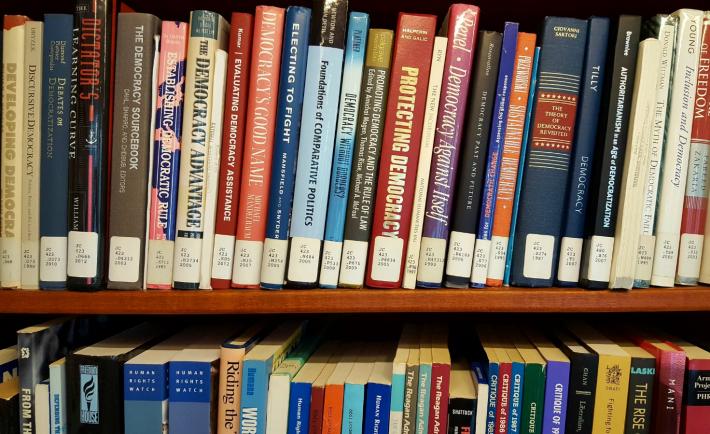“Our democracy is dead.”
I’ve heard this phrase uttered all across the world after the passage of a restrictive voter law, the closure of an independent news outlet or the results of a questionable election. Friends and acquaintances over the years have lamented: Because of x, my country is no longer a democracy.
Is it not? Was it ever?
As little “d” democrats, at NDI we frequently talk about what democracy means and, importantly, the benefits of a robust democracy and the consequences of its absence. We talk about components, systems and values of democracy, but when it comes to what democracy itself is, even we have trouble producing a concise definition.
I wanted to explore this topic for Democracy Day this year and make my own modest attempt at coming up with a concrete answer. Are there ingredients without which a democracy does not exist? Is civil society a nice to have or a must have? Is democracy even definable, or, rather -- to completely misappropriate the words of former U.S. Supreme Court Justice Potter Stewart -- do you just know it when you see it?
Democracy is much more than just elections. It is strong institutions and freedoms and rights. It incorporates sovereignty of the people. An independent judiciary. It is the uncorrupted expression of the true will of the people. Majority rule with minority protection. A free press. Oh and a government, ideally with checks and balances. And, um, inked pointer fingers and “I Voted” stickers?
I am no Merriam-Webster, but the above is decidedly not a definition. Actually, in my humble opinion, neither is theirs.
I consulted some experts, chatting with NDI’s Ken Wollack and Pat Merloe and reading through some of Madeleine Albright’s speeches. I even spent some time with my old grad school buddies, John Locke and Jean-Jacques Rousseau (who were a little annoyed that I haven’t been in touch). I got a sense of all the different elements that can go into a democracy.
Then I made this:
My conclusion: democracy is a system of governance that exists at the point where inclusion, transparency and accountability intersect with institutions, social contract and rule of law.
In order to qualify as a democracy, a country must have institutions, including (but not limited to) a legislature, an executive, an independent judiciary, political parties, media and a body that oversees elections. It must have some sort of social contract with its citizens, likely a constitution, that provides for freedoms and rights while outlining responsibilities. The country must also have rule of law, which punishes crimes and where everyone is treated equally.
In a democracy, inclusion means that no one is excluded from participating in the process of shaping policy and choosing representatives. The citizenry must have the right to know how the process works and what their government is doing, so transparency is also key. Finally, accountability means that a structure exists whereby the powers that be face consequences if they do not follow the rules.
At the intersection of transparency + pluralism + the media, for example, you find public debate, a democratic value. At the intersection of rule of law + accountability + political parties + rights lies majority rule, minority protection. There are similar equations for civil society, women’s rights, youth engagement, political opposition, competitive elections, access to true information, due process, human rights and every other pillar of democracy.
Visually, I think the definition of democracy would look something like this:
.jpg)
It is complex and a little messy, but democracy does, indeed, have parameters.
In declaring the demise of democracy in their respective countries, my aforementioned friends and acquaintances were referring to the closing of some of these spaces. A restrictive voter law messes with inclusion + competitive elections, while an attack on a newspaper alters transparency + freedom of the press. If we don’t trust the way an election was called, maybe accountability + election oversight is at risk.
Democracy is a process. It is imperfect and needs to be constantly nurtured and protected as we push it closer to the ideal. Democracy is a big, beautiful, evolving creature that comes in various shapes and sizes and speaks with a slightly different accent in each place it resides. As long as it maintains a few fundamental components, however, it qualifies.
Since democratic principles provide fertile ground for our values and hopes and dreams to take root and blossom, of course we tend to talk about democracy in terms of what it means to us, rather than what it is. Therefore, I find it very fitting that for Democracy Day this year, NDI made Spoken World | Democracy, a spoken word video about democracy, and will be launching a #SpokenWorldNDI social media campaign so others can share their expressions of democracy through poetry.
To add to the celebration, I leave you with one of my favorite poems on the subject:
Democracy will not come
Today, this year
Nor ever
Through compromise and fear.
I have as much right
As the other fellow has
To stand
On my two feet
And own the land.
I tire so of hearing people say,
Let things take their course.
Tomorrow is another day.
I do not need my freedom when I'm dead.
I cannot live on tomorrow's bread.
Freedom
Is a strong seed
Planted
In a great need.
I live here, too.
I want freedom
Just as you.
- Langston Hughes
(By the way, inclusion + rights ⇧)


